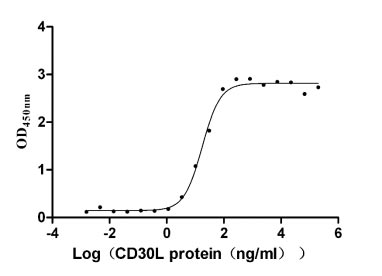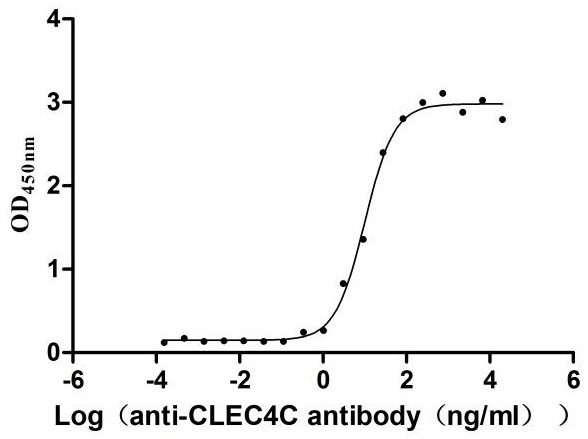Recombinant Xenopus laevis DNA polymerase delta subunit 2 (pold2)
-
中文名稱:有爪蟾蜍pold2重組蛋白
-
貨號(hào):CSB-YP018304XBE
-
規(guī)格:
-
來(lái)源:Yeast
-
其他:
-
中文名稱:有爪蟾蜍pold2重組蛋白
-
貨號(hào):CSB-EP018304XBE
-
規(guī)格:
-
來(lái)源:E.coli
-
其他:
-
中文名稱:有爪蟾蜍pold2重組蛋白
-
貨號(hào):CSB-EP018304XBE-B
-
規(guī)格:
-
來(lái)源:E.coli
-
共軛:Avi-tag Biotinylated
E. coli biotin ligase (BirA) is highly specific in covalently attaching biotin to the 15 amino acid AviTag peptide. This recombinant protein was biotinylated in vivo by AviTag-BirA technology, which method is BriA catalyzes amide linkage between the biotin and the specific lysine of the AviTag.
-
其他:
-
中文名稱:有爪蟾蜍pold2重組蛋白
-
貨號(hào):CSB-BP018304XBE
-
規(guī)格:
-
來(lái)源:Baculovirus
-
其他:
-
中文名稱:有爪蟾蜍pold2重組蛋白
-
貨號(hào):CSB-MP018304XBE
-
規(guī)格:
-
來(lái)源:Mammalian cell
-
其他:
產(chǎn)品詳情
-
純度:>85% (SDS-PAGE)
-
基因名:
-
Uniprot No.:
-
別名:pold2; cdc1DNA polymerase delta subunit 2; XlCdc1
-
種屬:Xenopus laevis (African clawed frog)
-
蛋白長(zhǎng)度:full length protein
-
表達(dá)區(qū)域:1-463
-
氨基酸序列MFTDLAISGG PGLLTAPSEV QSTFTRVSNT QYSNCSSIFR LGERTFTRQY AHIYATRLEQ MRPLLIKSAK QRWGDDIAVR KLCELQGGEK CCVIGTLFKS MELQPSILRE ISEEHNLLPQ PARQKYISDS DELILEDELQ RIKLEGATDV QQLVTGAVLA VLGAEEDAGK FVVEDFCLTS LPVQSPLPRL SEDRFVLLTS GLGLGGGSGD SLMGLQLLLD LVTGQAGAEE DQGCAARISR VILAGNLLSE NTQGKDSLNK AKYLSKKTQA ASVEAVKMLD EILLQMSGSV SVDVMPGAFD PTNYILPQQP LHRCMFPQSA LYSTLQLVTN PYEAEIDGVR FLGTSGQNIG DIYKYSSMQD YLDILEWTLQ VGHLCPTAPD TLGCYPFYKS DPFILQNCPH VYFCGSAPKF SCKEVTGAEG QRVLLLTVPE FCSTQTACLV NLRTLQCQPI SFSGFGADDE LGD
-
蛋白標(biāo)簽:Tag?type?will?be?determined?during?the?manufacturing?process.
The tag type will be determined during production process. If you have specified tag type, please tell us and we will develop the specified tag preferentially. -
產(chǎn)品提供形式:Lyophilized powder
Note: We will preferentially ship the format that we have in stock, however, if you have any special requirement for the format, please remark your requirement when placing the order, we will prepare according to your demand. -
復(fù)溶:We recommend that this vial be briefly centrifuged prior to opening to bring the contents to the bottom. Please reconstitute protein in deionized sterile water to a concentration of 0.1-1.0 mg/mL.We recommend to add 5-50% of glycerol (final concentration) and aliquot for long-term storage at -20℃/-80℃. Our default final concentration of glycerol is 50%. Customers could use it as reference.
-
儲(chǔ)存條件:Store at -20°C/-80°C upon receipt, aliquoting is necessary for mutiple use. Avoid repeated freeze-thaw cycles.
-
保質(zhì)期:The shelf life is related to many factors, storage state, buffer ingredients, storage temperature and the stability of the protein itself.
Generally, the shelf life of liquid form is 6 months at -20°C/-80°C. The shelf life of lyophilized form is 12 months at -20°C/-80°C. -
貨期:Delivery time may differ from different purchasing way or location, please kindly consult your local distributors for specific delivery time.Note: All of our proteins are default shipped with normal blue ice packs, if you request to ship with dry ice, please communicate with us in advance and extra fees will be charged.
-
注意事項(xiàng):Repeated freezing and thawing is not recommended. Store working aliquots at 4°C for up to one week.
-
Datasheet :Please contact us to get it.
靶點(diǎn)詳情
-
功能:As a component of the trimeric and tetrameric DNA polymerase delta complexes (Pol-delta3 and Pol-delta4, respectively), plays a role in high fidelity genome replication, including in lagging strand synthesis, and repair. Pol-delta3 and Pol-delta4 are characterized by the absence or the presence of POLD4. They exhibit differences in catalytic activity. Most notably, Pol-delta3 shows higher proofreading activity than Pol-delta4. Although both Pol-delta3 and Pol-delta4 process Okazaki fragments in vitro, Pol-delta3 may also be better suited to fulfill this task, exhibiting near-absence of strand displacement activity compared to Pol-delta4 and stalling on encounter with the 5'-blocking oligonucleotides. Pol-delta3 idling process may avoid the formation of a gap, while maintaining a nick that can be readily ligated. Along with DNA polymerase kappa, DNA polymerase delta carries out approximately half of nucleotide excision repair (NER) synthesis following UV irradiation. Under conditions of DNA replication stress, required for the repair of broken replication forks through break-induced replication (BIR). Involved in the translesion synthesis (TLS) of templates carrying O6-methylguanine or abasic sites performed by Pol-delta4, independently of DNA polymerase zeta (REV3L) or eta (POLH). Facilitates abasic site bypass by DNA polymerase delta by promoting extension from the nucleotide inserted opposite the lesion. Also involved in TLS as a component of the POLZ complex. Along with POLD3, dramatically increases the efficiency and processivity of DNA synthesis of the minimal DNA polymerase zeta complex, consisting of only REV3L and REV7.
-
亞細(xì)胞定位:Nucleus.
-
蛋白家族:DNA polymerase delta/II small subunit family
-
數(shù)據(jù)庫(kù)鏈接:
KEGG: xla:379793
UniGene: Xl.4169
Most popular with customers
-
Recombinant Human Tumor necrosis factor receptor superfamily member 8 (TNFRSF8), partial (Active)
Express system: Mammalian cell
Species: Homo sapiens (Human)
-
Recombinant Human C-X-C chemokine receptor type 4 (CXCR4)-VLPs (Active)
Express system: Mammalian cell
Species: Homo sapiens (Human)
-
Recombinant Human Desmoglein-3 (DSG3), partial (Active)
Express system: Baculovirus
Species: Homo sapiens (Human)
-
Recombinant Human Tomoregulin-2 (TMEFF2), partial (Active)
Express system: Mammalian cell
Species: Homo sapiens (Human)
-
Recombinant Human C-type lectin domain family 4 member C (CLEC4C), partial (Active)
Express system: Mammalian cell
Species: Homo sapiens (Human)
-
Recombinant Human CD81 antigen (CD81), partial (Active)
Express system: Mammalian cell
Species: Homo sapiens (Human)
-
Recombinant Mouse Cytotoxic and regulatory T-cell molecule (Crtam), partial (Active)
Express system: Mammalian cell
Species: Mus musculus (Mouse)
-
Recombinant Macaca fascicularis Dipeptidase 3(DPEP3) (Active)
Express system: Mammalian cell
Species: Macaca fascicularis (Crab-eating macaque) (Cynomolgus monkey)



-AC1.jpg)














